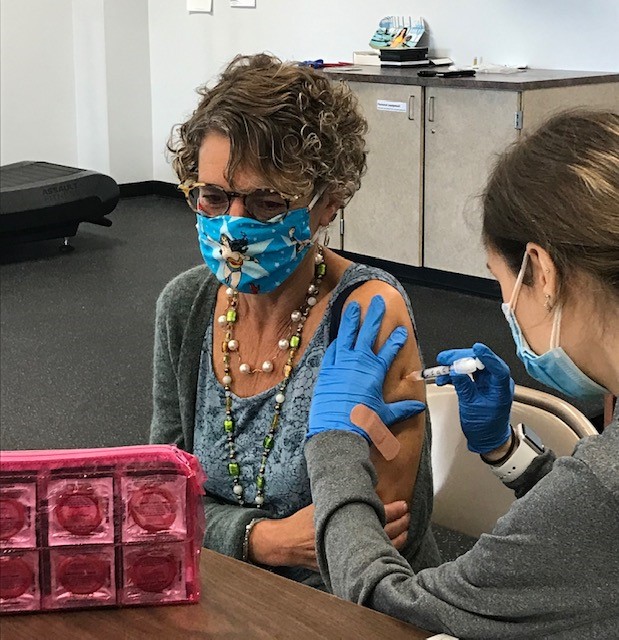The Erie County Department of Health strongly recommends a flu vaccine for everyone ages six months and older this fall. To encourage county residents to get vaccinated against flu, Deputy Executive Maria Whyte and Commissioner of Health Dr. Gale Burstein received their flu vaccination at a clinic for Erie County employees today, September 28, run by Wegmans.
“Now is the time to get your flu vaccine,” said Whyte. “By having more people in our community protected from flu infection this fall and winter, we can protect the most vulnerable in our community and reduce the days missed from work and school due to flu illness.” The Centers for Disease Control and Prevention (CDC) recommend a flu vaccine by the end of October.
“Last year, surveillance data showed very little flu activity in New York State and the northern hemisphere,” said Dr. Burstein. “Flu vaccination rates, people at home instead of in schools and in workplaces, a decrease in travel, and mask wearing and other non-pharmaceutical interventions contributed to those low flu infection levels. Now, with most people back to school and work and less people consistently masking, flu vaccine is among the best preventive tools we have to protect us at a community level.”
“Flu illness ranges from very mild to debilitating, especially for people who are over 65 years of age, younger than two years of age, living with a chronic medical condition, or pregnant or who may become pregnant,” explained Dr. Burstein. “As we say with the COVID-19 vaccine, flu vaccine provides a level of protection against illness, and it can also protect those around you.” COVID-19 vaccine and flu vaccine may be administered at the same time.
Caregivers, those who spend time with people at high risk for flu complications, and people who interact with the general public need to make flu vaccination a priority. The flu vaccine is an additional layer of protection for our community’s most vulnerable. That would include people who care for family members at home, and caregivers who work in child care settings, group homes and other congregate living sites, schools and healthcare facilities.
Groups at risk for flu complications and hospitalization:
Adults 65 years and older
Children younger than 2 years old
People with chronic medical conditions like
– Asthma
– Neurologic and neurodevelopment conditions
– Blood disorders (such as sickle cell disease)
– Chronic lung disease (such as chronic obstructive pulmonary disease [COPD] and cystic fibrosis)
– Endocrine disorders (such as diabetes mellitus)
– Heart disease (such as congenital heart disease, congestive heart failure and coronary artery disease)
– Kidney diseases
– Liver disorders
– Metabolic disorders (such as inherited metabolic disorders and mitochondrial disorders)
– People who are obese with a body mass index [BMI] of 40 or higher
– People with a weakened immune system due to disease (such as people with HIV or AIDS, or some cancers such as leukemia) or medications (such as those receiving chemotherapy or radiation treatment for cancer, or persons with chronic conditions requiring chronic corticosteroids or other drugs that suppress the immune system)
– People who have had a stroke
– Females who are pregnant and up to 2 weeks after the end of pregnancy
– People who live in nursing homes and other long-term care facilities
Who should get a flu vaccine?
Everyone ages 6 months and older. There are very few medical reasons for someone to avoid getting a flu vaccination. If you have questions, please check with your physician or pharmacist.
When should I get a flu vaccine?
The Centers for Disease Control and Prevention (CDC) recommend a flu vaccination before the end of October. And a flu vaccine received any time through the end of the 2021-2022 flu season will have a protective benefit. Don’t delay. The best protection comes before the flu season starts in early winter, and it takes up to two weeks to develop antibodies. Children who need two doses of flu vaccine should start the process sooner; two doses must be spaced four weeks apart. Influenza cases have already been diagnosed this season.
Where can I get a flu vaccine?
Nearly all pharmacies and many doctor’s offices offer flu vaccine. Call ahead to confirm vaccine availability.
Is there a cost for flu vaccine?
With most insurance plans, a flu vaccine is covered completely and there is no co-pay. Some pharmacies offer flu vaccine for a nominal fee.
Other information:
Wegmans is offering drive-thru flu vaccine clinics in the Buffalo area.
Visithttps://www.wegmans.com/pharmacy/immunizations/ for a schedule and details. Any organization in Erie County that will offer a flu clinic that is open to the public can share that information with ECDOH and we will promote on our social media channels.











